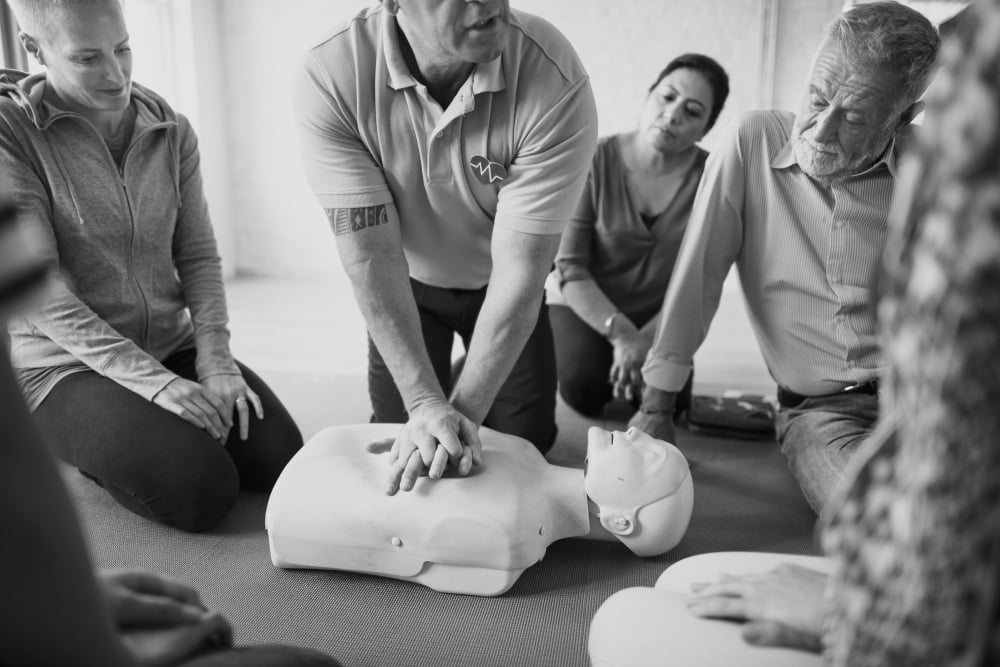Overcoming First Aid and CPR Anxiety for Child Care Providers
 First Aid and CPR training is a critical skill for individuals working in child care environments, where the #safety and well-being of children are of paramount importance. However, it's not uncommon for those new to the field to feel nervous and apprehensive about taking on this significant responsibility. It's completely normal to feel nervous or apprehensive about taking on the responsibility of First Aid and CPR training, especially when it involves the well-being of others, like children in a child care setting. However, keep in mind that these feelings are common and can be overcome with the right approach and support. Here are some steps to help you feel more confident:
First Aid and CPR training is a critical skill for individuals working in child care environments, where the #safety and well-being of children are of paramount importance. However, it's not uncommon for those new to the field to feel nervous and apprehensive about taking on this significant responsibility. It's completely normal to feel nervous or apprehensive about taking on the responsibility of First Aid and CPR training, especially when it involves the well-being of others, like children in a child care setting. However, keep in mind that these feelings are common and can be overcome with the right approach and support. Here are some steps to help you feel more confident:
-
Start with a Basic Course: Many First Aid and CPR courses are designed for beginners. Look for courses specifically tailored to individuals with little to no prior experience. These courses often cover the basics and build your skills gradually.
-
Take Your Time: Don't rush your training. Take your time to understand the techniques and principles thoroughly. You'll have ample opportunity to practice and ask questions during the training.
-
Practice Regularly: The more you practice, the more confident you will become. Training courses typically provide hands-on practice with manikins, so take advantage of this to hone your skills.
-
Ask Questions: Don't hesitate to ask your instructor questions if you're unsure about something. They are there to help you learn and feel confident in your abilities.
-
Gain Real-World Experience: If you feel nervous about dealing with real emergencies, consider volunteering or observing in a child care setting to see how trained professionals handle situations. This can provide valuable real-world experience.
-
Stay Current: First Aid and CPR guidelines may change over time. It's essential to keep your certification up to date by attending refresher courses when necessary.
-
Mental Preparation: Part of being confident in emergencies is having the right mindset. Focus on staying calm and taking decisive action. Training can help you develop the mental #preparedness needed to handle emergencies.
-
Teamwork: In a child care environment, you're not alone. Your colleagues can provide support, and working as a team can make managing emergencies less daunting.
-
Understand Your Limitations: While First Aid and CPR training is valuable, it's important to know your limitations and when to call for professional medical assistance. Your primary role is to provide initial care until help arrives.
-
Reflect on the Impact: Remember that the skills you're learning can have a significant impact on the well-being of children. The confidence and competence you gain can save lives and provide comfort to families.
Lastly, if you find that your anxiety is overwhelming, consider speaking with a counselor or therapist. They can help you manage your anxiety and build the emotional resilience needed for situations that may arise in a child care setting. Over time, your confidence is likely to grow as you become more familiar with the training and gain experience in real-life scenarios.
Register with ChildCareEd and choose from our two different First Aid and CPR training formats.
- First Aid & CPR Blended
- 3 hours of online self-paced training and 1 hour of in-person skills and drills training
- First Aid and CPR In-person
- 4 hours of in-person training
- Pediatric RSV First Aid & CPR/AED
- Pediatric Blended First Aid & CPR/AED Adult, Child, Infant
- Pediatric In-Person First Aid & CPR/AED Adult, Child, Infant
- Adult First Aid Only - Blended
- Basic Health & Safety and Breastfeeding Awareness
- Adult Only CPR AED and Adult First Aid Blended
- Texas Director Credential
- CPR for childcare providers: what to know
- Maryland! Get your First Aid and CPR certification!
- Focus on Health and Safety Training
- 8 Benefits of First Aid and CPR training
- Overcoming First Aid and CPR Anxiety for Child Care Providers
- First Aid and CPR Training for Child Care Providers in Maryland
- Building a Comprehensive First Aid Kit and Knowing How to Use It
- First Aid and CPR Certification: What to Expect from Your Training Course
- Child Care Providers and First Aid for Choking
- The ABCs of First Aid: Airway, Breathing, and Circulation for Child Care Providers
- Slaying Metaphorical Dragons of Fear and Self-Doubt in Childcare Educators
- CPR and First Aid Training for Child Care Providers: Essential Skills for Emergencies
- Basic Health and Safety Training: The Essential Guide for New Child Care
- Emergency Preparedness Training for Childcare Providers: Keeping Kids Safe in a Crisis
- A Beginner’s Guide to Medical Administration Training in Child Care
- California Child Care Certificate Renewals: What to Renew and When